Our Experts
Our expert, award-winning staff selects the products we cover and rigorously researches and tests our top picks. If you buy through our links, we may get a commission.
Best Peloton Alternatives for 2024
Which is the best Peloton alternative?
Best Peloton alternatives of 2024
Echelon Smart Connect Bike EX3
Comparing Peloton alternatives
How we test Peloton alternatives
Factors to consider when choosing a Peloton alternative
How we test Peloton alternatives
Workouts you can do with Peloton alternatives
Best practices for Peloton alternatives
Which bike is Peloton’s biggest competitor?
What should I look for when buying an indoor exercise bike?
Which muscles does indoor cycling work?
Is a built-in or BYO screen better?
Is a subscription necessary?
It’s always a good time to think about getting fit, and one good way to get in a full-body workout without leaving your house is by investing in a home-based exercise bike. An exercise bike is a more space-efficient option than a treadmill, allowing you to exercise to your heart’s content even with a limited amount of room. One of the major players in this space is Peloton, renowned for its high-quality equipment and a diverse selection of on-demand classes. Peloton provides interactive virtual workouts led by experienced instructors, allowing you to connect with other users and stay motivated as you incorporate regular physical activity into your daily routine.
However, it does cost quite a bit to get into Peloton. But if you don’t have the budget, you’ll be happy to know there are exercise bike alternatives. If you’re shopping for yourself or another cycling lover this holiday season, we have tested various exercise bike options to help you find the best alternative to the Peloton bike that fits your budget and fitness goals.
Our Picks
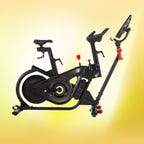
Best overall Peloton alternative
BowFlex VeloCore
View details
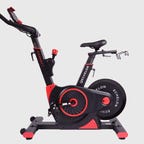
Best budget Peloton alternative
Echelon Smart Connect Bike EX3
View details
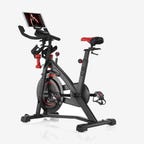
Best Peloton alternative with no subscription
BowFlex C6
View details
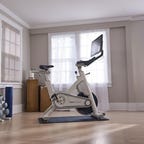
Best Peloton alternative for full-body workouts
Myx II Plus
View details
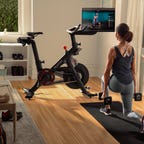
Best if money is no object
Peloton Bike Plus
View details
FITNESS TRACKER DEALS OF THE WEEK
Deals are selected by the CNET Group commerce team, and may be unrelated to this article.
Which is the best Peloton alternative?
I’ve been testing indoor bikes for more than five years now, and while I don’t think there’s a single bike that’s perfect for all people I would say the best overall Peloton alternative is the BowFlex Velocore series. If you’re looking for a large display with a variety of options that Peloton does not offer, you will be pleased with this bike. However, if a giant screen is not a priority for you, there is a budget-friendly version available with a 16-inch display.
Editor’s note, June 10: BowFlex filed for Chapter 11 bankruptcy earlier this year, and the brand is now owned by Johnson Health Tech, which also owns Horizon Fitness and Matrix. You can still buy BowFlex products through its website and via retailers such as Amazon and Dick’s Sporting Goods.
Best Peloton alternatives of 2024
CNET Score Breakdown
Software Ease of Use 8 Functionality 10 Warranty 6 Features 10
Comparing Peloton alternatives
| Max weight (pounds) | Cost | Dimensions (LxWxH, inches) | Screen size (inches) | Workout types | |
|---|---|---|---|---|---|
| BowFlex VeloCore | 325 | $999 | 59.8″ L x 24.1″ W x 55.3″ H | 16″ or 22″ | Full body |
| Echelon EX3 | 300 | $620 | 59″ L x 23″ W x 53″ H | Tablet holder only | Cycling only |
| BowFlex C6 | 330 | $799 | 54.6″ L x 30.7″ W x 51.8″ H | Tablet holder, performance-only LCD | Cycling only |
| Myx II Plus/BODi Bike | 350 | $399 | 54″ L x 21″ W x 47″ H | 21.5″ | Full body |
| Peloton Bike Plus | 297 | $2,495 | 59″ L x 22″ W x 59″ H | 23.8″ | Full body |
| Stryde | 350 | $1,395 | 49.6″ L x 24″ W x 46″ H | 21.5″ | Cycling only |
How we test Peloton alternatives
Every indoor bike has the same basic feature set, but testing any bike as a viable Peloton alternative means the bike needs to meet a few basic benchmarks. When testing any indoor bike, we’re primarily interested in measuring the following:
- Size, stability and comfort: How well this bike fits in your home and how comfortable it is to ride in a home. This includes ease of assembly, how much noise the bike makes and how well it tucks away when not in use if that’s what you need in your space.
- Software features: If this is a Peloton alternative, it needs to be able to deliver a lot of different things all at once. This includes heart-rate monitoring and reporting, access to a wide variety of workout types and the ability to use your bike in a competitive workout environment (real or virtual)
- Cycling flexibility: It’s important that the indoor bikes we consider as Peloton alternatives be able to challenge a wide variety of skill levels. This means something on this list allows for clearly defined difficulty levels and allows for someone with preferred cycling shoes to comfortably use the bike.
Each bike we have access to is thoroughly tested by riding in three different situations: HIIT workouts, 20-mile performance rides and more casual 30-minute cycling sessions. If we have not yet had access to the bike but find its features interesting, this detail is called out in the section.
Factors to consider when choosing a Peloton alternative
There’s no such thing as one bike for every kind of rider out there, and while Peloton makes a great bike there may be better options out there depending on your needs. With that in mind, we test all of our indoor bikes using the same criteria.
Price
Consider how much you’re willing to spend on an indoor bike. A big part of our testing is identifying which areas of an ideal cycling experience can be reduced to save money without impacting the quality of your workout.
Subscription quality
Many smart bikes now include a subscription to access their classes. Decide if a member subscription is important to your indoor cycling experience or if you want an option to just ride. For example, some subscription services offer less expensive options to add family members.
Physical space
A lot of indoor bikes take up a lot of room, and a big part of making sure your purchase doesn’t quickly become a very expensive clothesline is making sure it’s the right size for your space without sacrificing the things that make a good workout.
Workout quality
At the end of the day whatever bike you choose needs to be enjoyable to use. This means testing the seat for extended periods, as well as the different riding positions you’d want to be in while riding.
How we test Peloton alternatives
Like so many other things at CNET, we test exercise bikes as thoroughly as possible through rigorous examination and comparison. Each exercise bike in our list has been through at least 100 miles of riding, using as many of the built-in features as possible. Every exercise bike is judged against the following metrics:
Exercise bike volume
Every workout makes some noise, but a quieter bike typically means greater build quality. At the same time, if an exercise bike has a built-in display with speakers it’s important to know it’s possible to clearly hear the class instructor or your favorite TV show over the sound of you working out.
Riding position flexibility
It’s important to be able to set your exercise bike to the riding position that works best for you and be able to ride in that position for extended periods. All of the bikes in this list are tested in cruiser, neutral and competition riding positions to ensure comfort for as many body types as possible.
Software compatibility
Even if your bike doesn’t have a display, it likely has a way to connect to your phone or tablet to access performance apps. That testing doesn’t end at the ability to connect to a phone, the accuracy of the information sent from the bike to your phone makes a big difference, especially if you’re counting calories or you want to use a competitive racing app to ride with friends. Making sure the power you push into your exercise bike is accurately reflected in the information sent to apps makes a big difference.
Workouts you can do with Peloton alternatives
Peloton is considered the best of the best when it comes to exercise bikes. Other exercise bikes allow you to do the same workouts with some differences. For example, there may be bikes that have their own version of a touchscreen and cycling classes. Most workouts you do on a Peloton can be done on a Peloton alternative as well. Some exercise you may want to try include:
- Low intensity ride: If you’re new to using an exercise bike, you would benefit from getting acquainted with it first. This can include riding it for a short period and getting used to the resistance levels, as well as making sure the seat is set up adequately for your height. Low intensity rides where you’re not trying to hit any PR’s can also provide cardiovascular benefits without getting significantly out of breath.
- High Intensity Interval Training (HIIT): If you’re used to riding on an exercise bike, then you’re familiar with HIIT rides. You use short bursts of energy followed by a rest period and you can play around with the resistance to make the ride harder or easier. Additionally, it’s a good way to get a quick workout in less than a half hour.
- Hills and Sprinting: If you’re focusing on improving your stamina and endurance, practicing cycling uphill with heavy resistance and sprinting on little to no resistance on an exercise bike is a good way to do so.
Best practices for Peloton alternatives
- Adjust saddle and handle bars accordingly: One of the first things you have to make sure is set up correctly on an exercise bike, is the seat (saddle) and handlebars height. This will vary per person, but ideally you want the seat to be hip height and you may need to make additional adjustments.
- Wear the right shoes: Some Peloton alternatives may require clip-in shoes (just like Peloton), while others have cages that are appropriate for any sneaker. Make sure your feet are properly strapped in or clipped in before riding.
- Know all the exercise bike features: It helps to know which way to turn the knob on your exercise bike to add or take away resistance. If there is a touchscreen, it’s helpful to know how to access the classes and other features on your device. Additionally, for safety reasons it’s important to know how to abruptly stop the bike in case of an emergency.
Peloton alternatives FAQ
Which bike is Peloton’s biggest competitor?
This is a tough question to answer because it depends on what kind of cyclist you are. If you’re new to cycling and want the gym experience at home, the biggest competition to Peloton would be the Myx II Pro referenced above. If you’re a more advanced cyclist looking for a way to get in a variety of workouts at home without needing to go to a scheduled spin class, the competition to Peloton would likely look more like an indoor trainer where you’re using your own road bike hooked up to a Wahoo Kickr Smart Trainer.
Because indoor bikes like Peloton reach such a broad audience of cyclists, your level of enthusiasm has a ton of weight on your choice.
What should I look for when buying an indoor exercise bike?
Before you decide which indoor exercise to buy, you’ll want to consider several things including cost, size, display screen and whether or not you’ll need a monthly subscription. If your main goal is to simulate the experience of riding outdoors, for instance, you’ll want a bike like the Bowflex VeloCore, which offers a realistic road feel and can mimic the way you lean into turns. If your main goal is to get the most bang for your buck, you’ll want to consider something like the Bowflex C6.
Which muscles does indoor cycling work?
Indoor cycling is a full-body workout. It targets your core, upper body, back, glutes, quadriceps, hamstrings and lower legs. Some bikes also include weights so you can more specifically target muscle groups in your arms.
Is a built-in or BYO screen better?
The most eye-catching aspect of the Peloton exercise bike is, without question, its big HD touchscreen. That’s also a big reason the bike is so expensive; many indoor spin bike competitors come with a smaller screen or none at all. The BowFlex C6, for example, doesn’t come with any kind of display. Instead, it has a mount for your tablet. The smaller screen may not draw you in as much, but a tablet lets you do things other than watch indoor cycling class videos like read books, stream Netflix or even go on virtual outdoor scenic rides. I’m not saying one is definitively better than another — there are pros and cons to built-in and BYO screens.
Is a subscription necessary?
If your goal when buying a piece of home-fitness equipment is to avoid pricey gym or class memberships, some of these bikes may leave you scratching your head. As noted, Peloton charges $44 a month; Myx Fitness runs a little cheaper at $39, while Echelon’s plans range from $30 to $35. If you buy a NordicTrack cycle, you get your first year of the iFit service free and after that, it costs $39 a month.
You can use any of these bikes independently, though; you don’t have to take a class (but Peloton does require a minimum one-year subscription as part of your purchase). If you decide not to pay for a membership and fitness app, some bikes will no longer collect or display data, such as speed and distance, about your rides, which is one of the reasons someone might choose an indoor bike over a road bike.
Much as you might dislike the idea of yet another monthly subscription, even $40 is less than what you’d typically pay for just two or three drop-in cardio workout classes at your favorite indoor cycle studio (and it’s worth it if you find a particular Peloton instructor particularly motivating). Just be sure to factor that cost into the overall expenditure and, where possible, look for discounts on the prepaid, annual subscriptions.


